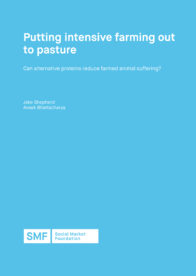The market for meat alternatives has grown rapidly over the last decade, yet they still only account for 1% of the global meat market. This report, the third and final instalment of a series, investigates the potential for further growth in the alternative meat market, and how far these products can drive a meaningful shift in eating habits.
SUMMARY:
- Although the market for meat alternatives has grown by 400% in the UK in the last decade, a decline in sales in 2022 has stalled momentum.
- Forecasts for the potential for growth of the global alternative protein market by 2040 vary wildly. The experts we spoke to estimated that alternative proteins could make up anywhere from 3% to 70% of the market, averaging around a third.
- Most experts agreed that supply-side improvements – making products cheaper and tastier – are the key growing the market, requiring investment in research and development to spur innovation.
- The development of cultivated meat is seen as key for the prospects of alternative protein growth, though some analysts are sceptical that cultivated meat will ever be cost competitive due to ‘extreme’ technical barriers.
- The growth of alternative proteins will almost certainly prevent farm animals from being reared in lower-welfare conditions, as the evidence suggests that consumers of alternative proteins buy less meat.
- If alternative proteins reach the 30% market share predicted by respondents by 2040, it would result in over 300 million fewer animals being raised in factory farms and slaughtered every year.
- Experts agreed that streamlining regulation for novel foods would be the most effective government intervention to grow the alternative meat market. Stricter farm animal welfare regulations and informational measures were seen as less effective.
- There was also support for public investment in research and development to help improve quality and efficiency – but there are no guarantees that this investment will see a return.
- Promoting policies that support the growth of alternative proteins is a ‘low cost, low regret’ activity for animal welfare advocates and it should supplement their other objectives, such as improvements to farm conditions.

DOWNLOAD THE REPORT: PDF
Kindly sponsored by

